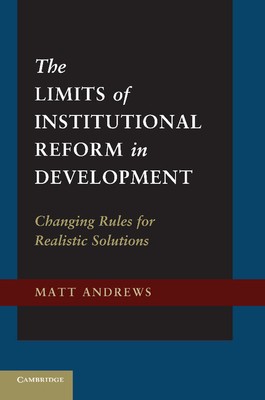
- We will send in 10–14 business days.
- Author: Matt Andrews
- Publisher: Cambridge University Press
- ISBN-10: 1107684889
- ISBN-13: 9781107684881
- Format: 15.2 x 22.9 x 1.6 cm, softcover
- Language: English
- SAVE -10% with code: EXTRA
Reviews
Description
This book explains why many institutional reforms in developing countries have limited success and suggests ways to overcome these limits. The author argues that reforms often fail to make governments better because they are introduced as signals to gain short-term support. These signals introduce unrealistic best practices that do not fit developing country contexts and are not considered relevant by implementing agents. The result is a set of new forms that do not function. However, there are realistic solutions emerging from institutional reforms in some developing countries. Lessons from these experiences suggest that reform limits, although challenging to adopt, can be overcome by focusing change on problem solving through an incremental process that involves multiple agents.
EXTRA 10 % discount with code: EXTRA
The promotion ends in 19d.16:45:08
The discount code is valid when purchasing from 10 €. Discounts do not stack.
- Author: Matt Andrews
- Publisher: Cambridge University Press
- ISBN-10: 1107684889
- ISBN-13: 9781107684881
- Format: 15.2 x 22.9 x 1.6 cm, softcover
- Language: English English
This book explains why many institutional reforms in developing countries have limited success and suggests ways to overcome these limits. The author argues that reforms often fail to make governments better because they are introduced as signals to gain short-term support. These signals introduce unrealistic best practices that do not fit developing country contexts and are not considered relevant by implementing agents. The result is a set of new forms that do not function. However, there are realistic solutions emerging from institutional reforms in some developing countries. Lessons from these experiences suggest that reform limits, although challenging to adopt, can be overcome by focusing change on problem solving through an incremental process that involves multiple agents.


Reviews